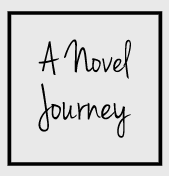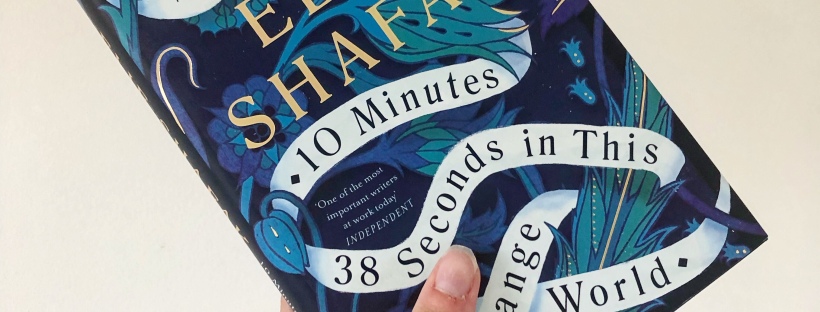I want to spend my days walking around with this book, recommending it to people. I want to share the passages that made me weep with recognition; that made me laugh out loud; that made me stop and think. 10 Minutes 38 Seconds in This Strange World is a book to savour, treasure and love.
There’s a notion that after death, your brain carries on working for a further 10 minutes and 38 seconds. And through evocative, sensual memories, Elif Shafak tells the story of Tequila Leila’s life, in each of her remaining minutes. We see her childhood and family (big trigger warning here – message me for details). And we meet the friends she makes; the family she chooses for herself.
The five friends – Sabotage Sinan, Nostalgia Nalan, Jameelah, Zaynab122, Hollywood Humeyra – give us a different angle to see Leila through. Shafak shares some of their secrets with us; Sinan’s childhood, Nalan’s gender identity, Jameelah’s spirituality, Zaynab’s courage, Humeyra’s demons. And through their eyes, we see Leila’s loss more vividly than simply moving through her memories.
Shafak weaves together humanity, magic and spirituality in this lyrical ode to love, life and friendship. The boundaries between right and wrong blur, just as they do between fantasy and reality.
“Just because you think it’s safe here, it doesn’t mean this is the right place for you, her heart countered. Sometimes where you feel most safe is where you least belong.”
There’s something about 10 Minutes that struck a chord. I’m not sure whether it’s my admiration of Shafak, whether it’s her stupendous writing; or whether it’s Leila and her five extraordinary friends. Either way, this book has haunted me since finishing: I can’t drag my thoughts away from the streets of Istanbul and Leila’s life.
A nonlinear journey
10 Minutes is broken up into three parts, each taking a new perspective and telling a new story.
Part one – The Mind – recounts Leila’s life, a memory for each of the ten minutes she has left. Part two – The Body – focuses on her friends as they try to do what’s right for her. And part three – The Soul – is the goosebumpy ending that brings Leila’s life to full circle.
Each part is distinctive: there’s no muddling up what happens between each. I loved this structure and felt it enhanced the story. The nonlinear leaps and hops brought together the eccentricities of Leila and her friends, as well as Istanbul’s unrelenting atmosphere. And, when talking about death, would a straightforward narrative work? I’m not so sure.
The second part, where Leila’s friends to step in and make things right, reminded me of The Ministry of Utmost Happiness. It shares a similar theme of doing what’s right, rather than what’s legal. We see groups of people shunned by normal society, and in return, they shun society’s etiquette and customs. At once it’s both sad and chaotic, as these very different people – outcasts of normal society – try to deal with Leila’s death.
“‘We must do what we can to mend our lives, we owe that to ourselves – but we need to be careful not to break others while achieving that.’”
10 Minutes is easy to read, but it’s hard to experience. Shafak’s confident, witty tone takes you by the hand – but she leads you through horrendous moments of Leila’s life.
Friendship versus family
One of my favourite themes in 10 Minutes was the battle between friendship and family. We see the importance placed on doing what’s right for your family – at the cost of your own life and happiness. Leila’s family put their reputation and name above Leila herself. Bodies cannot be released without familial consent. Relationships cannot develop if families don’t approve. Shafak shows us time and time again where the notion of ‘family’ lets us down – and where friends pull us up.
“While it was true that nothing could take the place of a loving, happy blood family, in the absence of one, a good water family could wash away the hurt and pain collected inside like black soot. It was therefore possible for your friends to have a treasured place in your heart, and occupy a bigger space than all your kin combined.”
Yet friendship – friendships are a saving grace. They’re the family you choose for yourself, when all blood relations have cast you out. 10 Minutes is a love story to friendship: the lengths we’ll go to to save our loved ones.
“‘Maybe what you need to do is befriend your depression.’ / ‘What a funny thing to say, honey. How am I to do that?’ / ‘Well, think about it: a friend is someone you can walk with in the dark and learn lots of things from. But you also know you are different people – you and your friend. You are not your depression. You are much more than what your mood is today or tomorrow.’”
Beguiling and enticing language
10 Minutes is worth reading for the writing alone. It’s poetry with an edge: Shafak’s lyrical tone will occasionally flip reverse and go cold on you.
This unforgettable book took me on a journey to Istanbul’s cacophonous backstreets, its graveyards of the forgotten, its battle-scarred walls. Every sentence wraps around your senses, evocative and mesmerising, beguiling you and inviting you in. I couldn’t put this book down: as a result, I read far too late into the night and strained one of my eyes.
“‘Grief is a swallow,’ he said. ‘One day you wake up and you think it’s gone, but it’s only migrated to some other place, warming its feathers. Sooner or later, it will return and perch in your heart again.’”
Shafak’s language is playful, sombre, elegant and witty. Much of the prose sang its way through my mind: I struggle to think who else could tell Leila’s story as well as she. Yet despite Shafak’s literary style, it’s easy to read. I flew through the pages, Shafak’s writing like the soft but steady current of a river, taking you further away from your starting point.
Finding the story among silence
Elif Shafak says that storytellers, above almost everything, are interested in silences – the things we cannot talk about easily. And within these silences are political, cultural and sexual taboos. In 10 Minutes, Shafak brings silences to the surface and lets us hear them loud and clear.
From gender and geography to race and reality, Shafak’s work breaks down barriers. There is no either/or in 10 Minutes; there is no hard edge to anything. Instead, there are a million shades of grey and blurred lines.
There’s a lot of death in this book, somewhat unsurprisingly given the premise. But in 10 Minutes, death isn’t the end. It’s a way of criticising progress and questioning how you live. It’s a reflection on society and civilisation.
“If there was a God up there, He must be laughing His head off at a human race capable of making atomic bombs and building artificial intelligence, but still uncomfortable with their own mortality and unable to sort out what to do with their dead. How pathetic it was to try to relegate death to the periphery of life when death was at the centre of everything.”
Likewise, D/Ali, Leila’s partner, says the biggest difference between Western European cities and Istanbul is the cemeteries. In the former, graveyards are on the edge of towns and cities, while in the latter they sit on in the centre.
“Why insist on designing the future or remembering the past when we were all slipping and sliding our way to the final exit?”
This passage really made me think: when you’re constantly reminded of the futility of mortal life, how can you care for the future?
Shafak’s love for Istanbul is clear. No one can write such an ardent love letter to a city without feeling it in their blood. But this doesn’t lessen her criticisms of her country. Corruption and cover-ups are frequently mentioned, and always with a brutality that doesn’t feature elsewhere in Shafak’s language. She makes no effort to hide the city’s dangers and atrocities. Yet this doesn’t diminish the city for what it is; just the people within it.
Final thoughts
It’s no surprise that Shafak is deemed one of the most important writers of our time. She’s fearless in the face of a government that’s hell-bent on erasing literature and free-thinking. Read her article here for more background on that. She writes in an easy-going poetic way that’s both enticing and sticky: I struggled to put this down, but equally wanted to savour every sentence. She speaks to you like an old friend: there are hints of shared secrets and inside jokes in her writing, and she makes it clear that this story is being told directly to you.
I love 10 Minutes. It’s beautiful, sad and strange, and it tells a million different love stories – for a country and a city; for friends; for partners; for the eccentricities of life.
Read this when you need a reminder of how beautiful the written word can be. Read this when you need reassurance that you belong. Read this when you miss your friends, and when people tell you that blood is thicker than water.


Amazing review!!! I need to read this. It sounds utterly beguiling
LikeLiked by 2 people
Thank you! It’s utterly wonderful.
LikeLiked by 1 person
this sounds beautiful. great review.
LikeLiked by 2 people
Thank you!
LikeLiked by 1 person